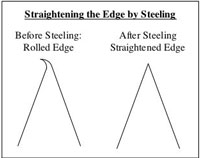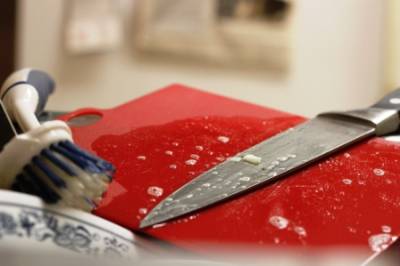Clean-up
Congratulations! You've just made a wonderful salsa, or a luscious beef wellington or a scrumptous pineapple upside-down cake. Now what?
It's time to clean up.
Before you throw the knife in the dishwasher, set it and forget it, you should know what that's going to do to your knife.
The intense steam and hot water crashing against your beautiful piece of cutlery will cause the handle to crack and seperate while having the knife fly all over your dishwasher, which isn't safe.
That's why you should never put a knife in the dishwasher. Itis too harsh for the blade and handle.
To properly wash your knife, you should wash in a sink of warm soapy water. You should put the knife and the cutting board you just used in the water, place the knife on the cutting board and use a soft brush to clean the knife.
Then, rinse and dry immediately. You don't want the knife to be out of its block, or however you chose to store your knives, longer than it has to be. If you leave it in the sink, then someone could reach in and hurt themselves.

Maintenence
To keep your knife always ready to cut, you need to be kind to your knife. You can keep a handle on your knife by regular honing and sharpening.
Regular use will take a blade out of "true," which means it will lean it to one side, so the blade still has its edge, but you can't use it.
A steel hones the edge back to "true."
Use a hone by putting the steel on your counter. Grab your knife at the heel and pretend to slice a thin slice off of the steel four to five times each side, then three each side, then two each side and then once on each side.
You should make your cuts at about a 22 degree angle, and repeat the process every time before you use your knife.
The knife can erode away, acidic ingredients wear it down. That requires sharpening. Professional chefs send their knives out to a professional knife sharpener every six months, and so should you.
People think the most dangerous knife is a sharp knife, but in the kitchen the most dangerous knife is a dull knife.
